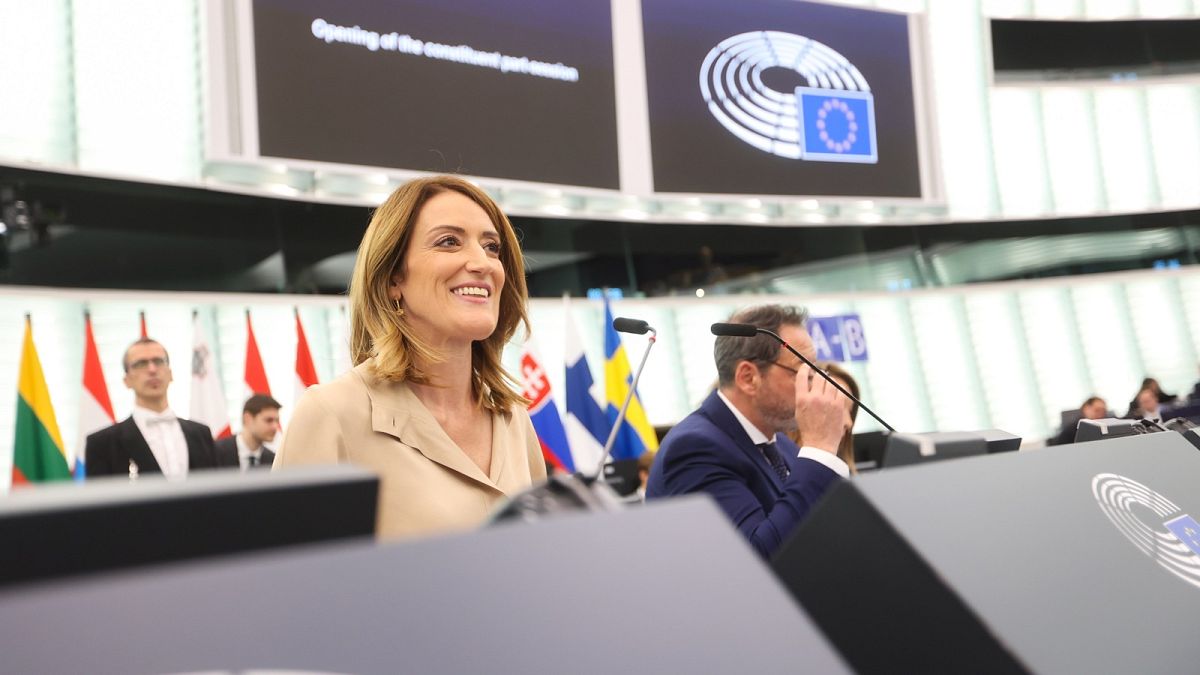The 720 Members of the European Parliament will be led by Roberta Metsola for the next two years and a half.
Roberta Metsola has been re-elected president of the European Parliament for the next two years and a half, marking the beginning of the 10th legislature in Strasbourg.
In a vote held on Tuesday morning, the 45-year-old Christian Democrat from Malta secured 562 votes in favour out of the 623 ballots cast by the newly-elected lawmakers, a comfortable victory that easily surpasses the necessary majority.
“We must be the voice that ensures all of our policies work and that they work well for young people, for families, for farmers and for industry alike,” she said in her acceptance speech.
“We have learnt that we can never take democracy for granted. We have seen that our European values are regarded by too many as a threat. It is a badge given to us by autocrats that we will continue to wear proudly,” she added.
Irene Montero, the symbolic challenger presented by the Left, obtained only 61 votes.
The result reflects Metsola’s rising profile as a pragmatic leader willing and capable of working with forces across the political spectrum and cements her credentials as one of the most prominent figures in the centre-right European People’s Party (EPP).
She was first elected in January 2022, following the sudden passing of her predecessor, David Sassoli. Her elevation was a breakthrough moment for Malta, which, as the smallest country in the EU, had never seen one of its citizens in such a high position.
Since then, Metsola has taken an active approach to her role as president, travelling across European capitals to deepen personal ties with heads of government and explain to citizens the Parliament’s often misunderstood role.
The president won plaudits when she visited Kyiv in early April 2022 and gave a heartfelt endorsement of the war-torn nation’s ambitions to join the bloc.
In December of that year, her leadership faced a gruelling test: the sudden explosion of the so-called Qatargate scandal, a cash-for-favours scandal that prompted the arrest of several MEPs. Metsola reacted with an updated code of conduct to increase transparency and crack down on corruption.
Metsola on Tuesday urged lawmakers to be accountable and open, upholding the Parliament’s integrity, while keeping a vigilant and critical attitude.
“Ours must become a Europe that is accessible to all, that everyone feels not only part of – but takes ownership of,” she said.
The president listed climate change, migration management, artificial intelligence, social rights, competitiveness, the simplification of bureaucracy, the fight against hate speech and the defence of fundamental values as areas on which lawmakers should focus to “leave Europe a better place than the one we found.”
She placed special emphasis on the need to continue supporting Ukraine’s resistance, the two-state solution in the Middle East, the reunification of Cyprus, women’s rights in Afghanistan and the democratic movement in Belarus.
“We must be ready to face this new world and this new reality,” she said.
In a key moment of her acceptance speech, Metsola denounced political polarisation, a worrisome trend that threatens co-existence in Western democracies.
“Polarisation in our societies has led to more confrontational politics, even political violence. The easy answers that divide our communities into ‘us’ and ‘them’. We need to move beyond this zero-sum thinking that has excluded people, that turns people away. That foments anger and hate rather than builds hope and belief,” she said.
“This is the House that stands for the opposite. That wants to build rather than destroy. That is not afraid to take the difficult path. That is able to find and use its voice for the common good.”
Her remarks come amid an increasingly charged landscape that, in the span of a few months, has seen assassination attempts against Slovak Prime Minister Robert Fico and former US President Donald Trump, an assault on Danish Prime Minister Mette Frederiksen, and the brutal beating of German MEP Matthias Ecke.
This article has been updated with quotes from Roberta Metsola’s acceptance speech.

